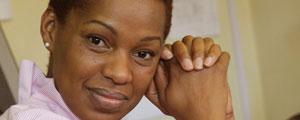
When I walked out of the polling station on Wednesday I could not help, but cry.
Report by Thembe Khumalo
I cried mostly because after standing in line for 8 hours, after watching all my fellow citizens dedicate an entire day to this process, after listening to them express their hopes and dreams for the country, for the future, for their children and their children’s children in so many different ways on so many occasions, I was gripped by the fear; the cold, nagging, dead weight of fear that all of this could have been in vain. That all the effort and all the people and all the time and all the emotions the country has invested might somehow be sideswiped, be derailed, be abused, or in any other way be made to count for nothing. This fear filled me with hopelessness.
I did not wake up on July 31 with thoughts of fear in my head.
On the contrary, the day started normally enough with the usual frivolous dilemma of what to wear, whether to carry a handbag and which handbag was best suited for the job, what to put in the handbag, etc. I was full of excitement, planning and plotting with my neighbour about whether we should take folding chairs, a picnic blanket, extra food, drinks, would they allow us to bring a newspaper into the polling station and so on and so on. I chose my clothes carefully, ensuring that I wore shoes I could run in if at all the need arose.
When we got to the polling station, we were stuck by the number, the long winding, queue of people waiting to make their voices heard in the conversation about leadership of this nation. On the one hand, I was disappointed that we would have to wait a long time, but on the other, I felt encouraged that people were taking an active part in the process, were choosing to live by choice and not by chance.
But by the time I reached the door of the school hall, eight hours of pondering had taken their toll, and the tears were welling up.
I cried because I realised that a special queue had been formed for those “vemaphiritsi” (on medication), a common euphemism for those who are HIV positive and on ARVs. I wondered what this did for disclosure and the right to privacy about one’s own health condition.
- Chamisa under fire over US$120K donation
- Mavhunga puts DeMbare into Chibuku quarterfinals
- Pension funds bet on Cabora Bassa oilfields
- Councils defy govt fire tender directive
Keep Reading
I cried because in eight hours we had formed such camaraderie and solidarity that I really believe if we had been invaded by some foreign force, we would have taken them on with the might of our unity and concord.
We were people of different backgrounds, different languages, different social stations. We had no clue who the next person would vote for, but we were there each one to exercise his right to choose.
Years ago someone told me that I should never underestimate the value of a shared experience and I understood that statement anew at the polling station. We had formed little communities in those eight hours, and it was a bittersweet recognition that the great equaliser would soon be over and we would go back in a matter of minutes to being Shonas and Ndebeles, managers and subordinates, affluent and poor, empowered and disempowered, belonging and rejected.
I cried because once I was inside the polling booth, I realised that I had no clue who any of the council candidates were and yet I voted.
I knew only one person on the parliamentary ballot paper, and I made a decision on that scanty knowledge. I knew all the candidates on the presidential ballot, but I did not vote for the one I thought would make the best leader, the one I would be proud to call my president.
I cried because I wondered whether I had participated in, or indeed enabled the performance of a farce.
I cried because when I got home, my young, white, affluent neighbours were having a party.
I wondered whether they had voted and I hated myself for being judgemental.
I thought of the young black boys I had been chatting to in the queue; I had called them “MaBornfree” and we’d had a hilarious discussion about age and shared memories of things we thought would prove were old enough to vote — like the drink called Tarino, and black and white television.
I tried not to compare the fates of these two groups of young people and I failed.
I borrowed the title of today’s column from Iyanla Vanzant’s harrowing biography and in a sense the tears we cry as women, as people of African descent, as any portion of humanity that does not fully realise its potential, are a universal telling of a sense of helplessness, disempowerment and feeling not in control of one’s own destiny.
I am hoping that all the tears we have all cried are not in vain.
I am hoping that at the end of this process everyone will feel justly rewarded for their efforts; will feel more able to access their dreams, more in control of their tomorrows, more hopeful for their children, and their children’s children.
I am hoping that tomorrow, when the results are announced, the only tears we shed, will be tears of joy, of fulfilment, of coming home.
I cried because I wondered whether I had participated in, or indeed enabled the performance of a farce.
Thembe Khumalo writes in her personal capacity. Readers’ comments can be sent to [email protected].











